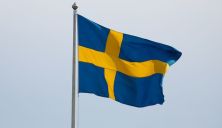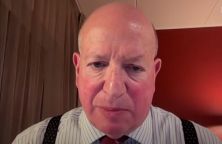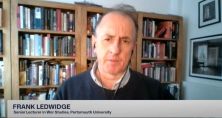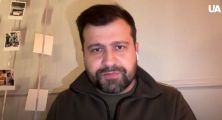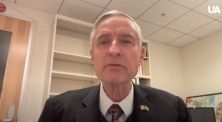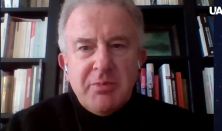Wanna know what triggered Putin, why you shouldn’t care about it too much and what is the future of Europe?
An expert who twice served as Lithuanian ex-Prime Minister and surely knows all the ins and outs of international politics, Andrius Kubilius answers your questions in an interview with our correspondent, UATV English reports.
— You were nominated to position in EU Commission. What field would be interesting for you? Which topic is interesting to share your knowledge experience and views?
— Well, thanks a lot for the question, especially when you are formulating what is my interest. There are possibilities of different interests, and of course, the most important will be the position and view of the Commission President, Ursula von der Leyen. I will, of course, have discussions with her, and that is still pending.
If we speak about how I see the whole situation, I think that as a representative of Lithuania—not just me personally, but looking at Lithuania’s interests—I can describe it in a very simple way. We have some unique experience compared to other EU members, especially concerning security issues, defense issues, EU enlargement, and everything related to what I call the Europe East Direction, including Ukraine, Moldova, and of course, the Western Balkans.
That’s where we can offer the Commission the biggest added value. We have experience being neighbors to the region where Europe’s security is most visible, given the context of Russian aggression against Ukraine and so on. That’s what I will discuss with the Commission President, as well as with European political parties, particularly the European People’s Party to which we belong. They have a vision, and I hope we will find the best agreement and solution.
— The leader of your party, Manfred Weber, wanted to see a representative of Lithuania as the Commissioner in charge of enlargement. Do you think this topic, which was somewhat abandoned in Brussels over the last five or ten years, should be revisited or restarted?
— I would say that until 2022, until Russian aggression against Ukraine, enlargement was not moving forward. We saw it as a challenge or a problem. For example, the Western Balkans, where countries became candidate countries much earlier than Ukraine, were also not progressing.
The beginning of Russian aggression brought a clearer understanding within the EU that non-enlargement provokes Russian aggression.
Leaving countries like Ukraine, Moldova, and the Western Balkans in a gray zone of security creates a temptation for Putin’s aggressive regime to start conflicts.
Things started to change after 2022. Ukraine and Moldova were invited to become candidate countries, negotiations started, and progress is being made. But a lot of practical work and political initiatives are still needed both on the EU side and within the candidate countries to ensure successful enlargement.
— You are known as a friend of Ukraine and have advocated for increasing aid, specifically promoting the idea that EU countries should spend 0.25% of GDP on supporting Ukraine. As a potential commissioner, will you continue to support this idea?
— Definitely. Ukraine will remain a crucial strategic priority for the European Union and the Commission over the next five years. You can see this priority clearly in the political guidelines set by the Commission President, which were announced before she received approval from the European Parliament.
What the EU achieves in the next five years will influence its future for the next 50 years. Some policy initiatives I proposed in the previous European Parliament term have become official policies for the European People’s Party.
For example, increasing military support to Ukraine was an idea I supported, and there was a need for a European plan for Ukraine’s victory against Russian aggression. We calculated that Western support to Ukraine should be increased 2.5 times, from 0.1% of GDP to 0.25%.
This could be achieved either by member states or through collective EU decisions to provide this amount of military support through EU finances or frozen Russian assets. This will continue to be EPP policy, and as a commissioner representing the EPP, I will do everything possible to support these initiatives.
— Do you see any bottlenecks in the current EU enlargement policy? What would you change or not change in the EU Commission’s approach?
— We need to understand that enlargement is a challenge for both candidate countries, which need to implement reforms, and the EU, which must assist more effectively. The EU needs a strong, consolidated political will to achieve enlargement, which depends not only on the Commission but also on member states.
We need to be more effective in convincing member states that EU enlargement is necessary, not just for Ukraine or Western Balkan countries, but for the whole European Union. This task is not only bureaucratic but also political and social. It requires clear political leadership to show the benefits of enlargement for all of Europe. Commissioners should support this agenda in the most effective way.
— Could the understanding of enlargement be changed? Should it be seen as a geopolitical issue rather than just a regional one?
— The Commission is creating a special commissioner for the Mediterranean region, including the Middle East, which is important.
When talking about enlargement, we focus on concrete regions: the Western Balkans and Eastern Partnership countries like Ukraine and Moldova. Georgia is falling behind due to its domestic issues.
But we should concentrate our efforts on these regions.
Enlargement will have a broader impact on European developments. Success for Ukraine through EU and NATO membership could significantly influence Russia and Belarus, which are still authoritarian.
A proper EU strategy for enlargement and Ukraine could have a major impact on the potential transformation in these authoritarian regions, which would be beneficial for the stability and peace of the entire European continent.
Read also: Kursk and fears of nuclear escalation. Interview with Jake Broe
